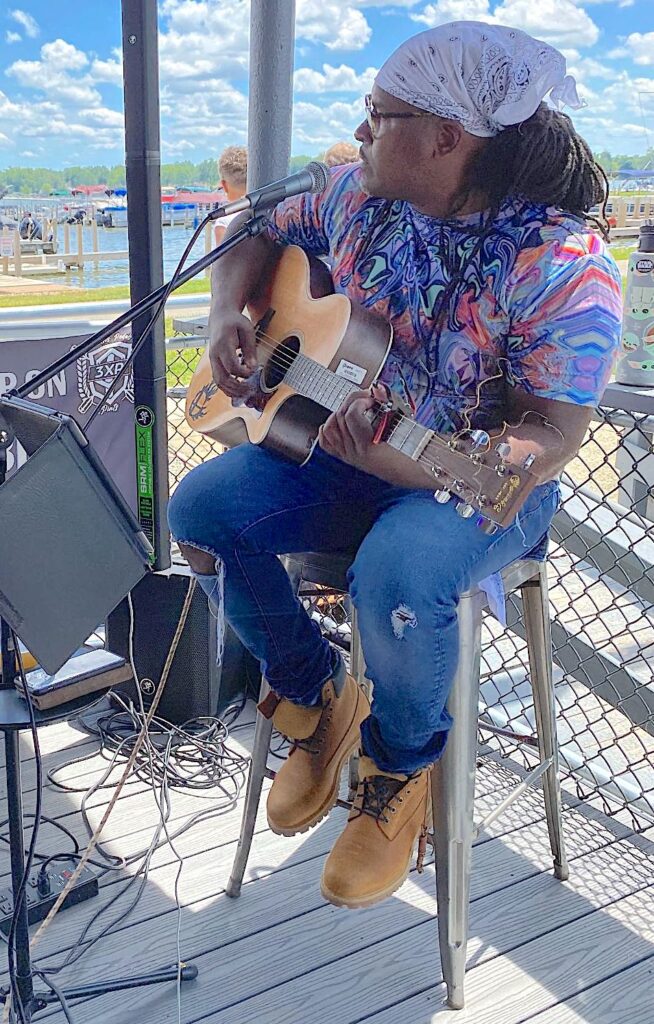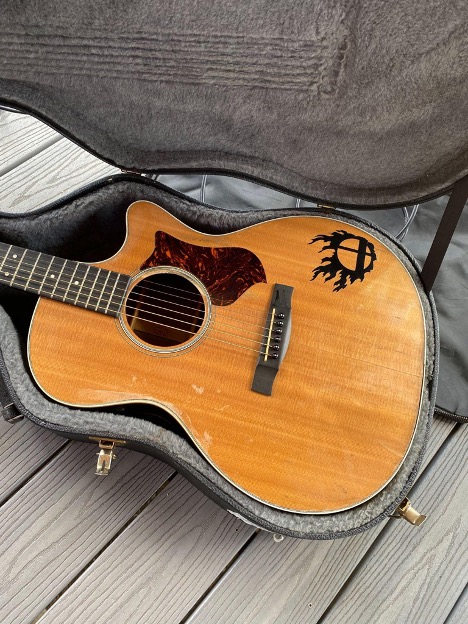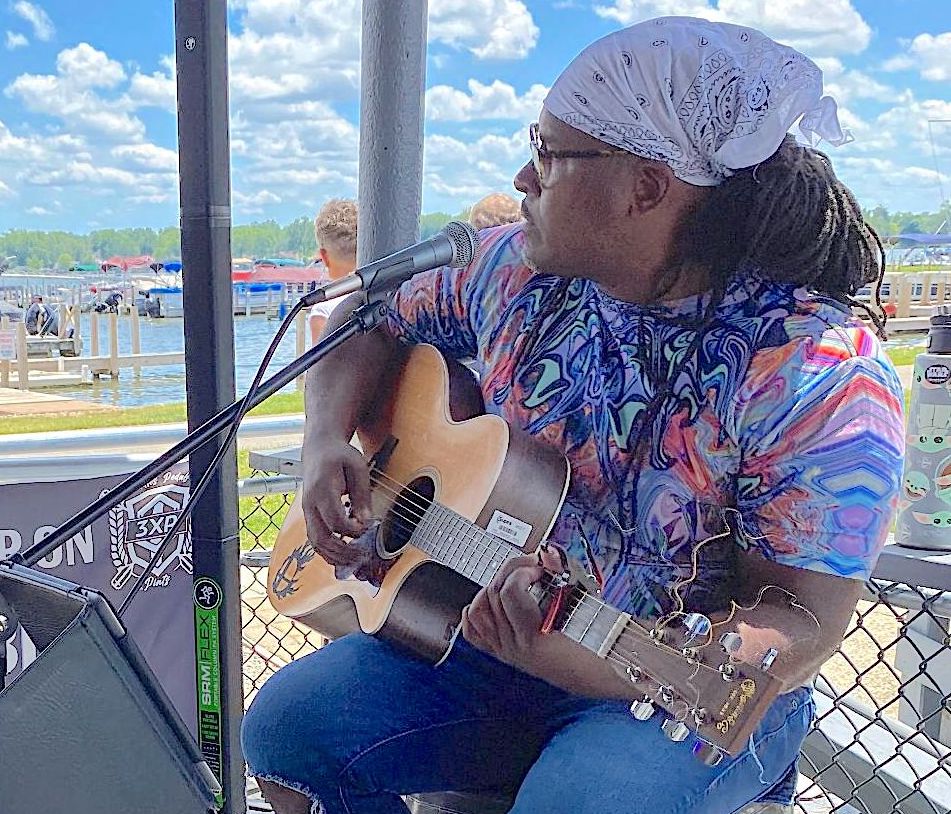There’s a 40-minute wait to get into Three Tigers Brewing Company, a taproom and restaurant serving Vietnamese-inspired street food and built in a former fire house station. Rese Jhordan is playing from 8 to 10:30 p.m.
He’s setting up near the entryway, under one of the opened garage doors. Behind him is an SRM-Flex stereo, a portable PA tower, rigged to a series of pedals, also rigged to his iPad, allowing him to flip through filters, sounds, and the setlist without lowering his instrument. On his music stand is a cupholder, within it a sweating IPA not yet touched. From a black case marked “RESE” in brown ink, he pulls out his Martin guitar.

Clock hits eight, he begins to play Mezzo forte, commanding the crowd’s attention. Sonically, he composes smooth textures, a glittering timbre, and a cool vibe for this humid Saturday. In terms of genre, there’s no discrimination: Jhordan merges the licks and lyrics of Johnny Cash’s “Folsom Prison Blues” into rhymes and rhythms from Rob Base and DJ EZ Rock’s “It Takes Two.”
Art traditions practiced and appreciated in Licking County include car customization and tuning for display at local events, like Mopar Nationals; pencil or acrylic or watercolor creations in shop windows, on shop walls; antique artifacts sold in old homes-turned-businesses, stocked basement to attic; glass blown into bowls and pipes, to be sold alongside customizable vape rigs at a growing number of graffitied stores; tattoos, of course; and then, the guitar.
Here, there, everywhere in Licking County, string bards play around downtown squares, in coffee shops, before open mics in bars.
Jhordan is a part of that tradition.
* * *
Jhordan was born in Akron in 1972, “but I’ve always had family in Newark, Ohio, and family in Huntsville, Alabama.” His parents divorced when he was 2, and he grew up mostly with his mother and her side of the family in Akron. The contrasts between big city, small town, and rural country, he says, inspired his eclectic musical upbringing.
“I listened to a lot of [my Mom’s] records, which were, you know, everything that was coming out in the late ’60s, ’70s, ’80s, like Michael Jackson, Prince, Stevie Wonder, Marvin Gaye; New Wave, Punk, Duran Duran, REO Speedwagon, Talking Heads – everything that was on MTV.”
But he didn’t yet have a creative outlet. Although he got some attention in elementary school by writing stories, poems, and drawing, Jhordan wasn’t “feeding the animal.”
“I started getting myself into situations and expressing myself in negative ways. Like, ‘Hey, I’m going to be the toughest. I’m not afraid of jail.’ But it was detrimental. I could’ve gotten locked up; I could’ve died.”
Jhordan was arrested at 14 for stealing cars and shot shortly after that in a separate incident that same year. “Finally, my mom’s like, ‘You know what? You’re done up here. I’m going to move you down with my dad in Newark.’”
This was around the time he was introduced to hip-hop music. “There were artists that inspired me to write and create and capture something,” he said.
One of them was Grandmaster Flash and the Furious Five with a song called “The Message.”
“It was literally the first hip hop song I heard that had a message,” he said. “It was about what life was like in the inner city.”
On the flow side, Eric B. and Rakim were instrumental, “because the flow was more communicative. Rakim was the first rapper I heard who wasn’t yelling.”
Their album Paid in Full made an impression on young Jhordan. “[The album] comes across like [Rakim], sitting and talking. The rhyme scheme wasn’t 1-2. He had inner rhyme, slant rhyme; he had more complexity to his writing. He made you think.”
“I was inspired to sit down and say, ‘I think I’m going to write a rhyme. I’m going to write a rap.’”
He took up boxing and found work as a lifeguard for the YMCA, as a summer camp counselor, and as a realtor. Additionally, he pursued and obtained his bachelor’s degree in English from The Ohio State University, finding brotherhood in the works of Milton, Yeats, and Frost.
He didn’t start playing music until he was 29. He played an electric guitar at first, but he said “all the electric noise got in the way.” The gift of an acoustic guitar from high-school friend Danny Phillips influenced his music.

“I wanted to find a way to bring it back to the earthier feel, like the singer-songwriters I grew up hearing in passing and were always around in the musical landscape. Cat Stevens, Jim Croce, like a lot of the blues my grandpa listened to, just simple and earthy.”
Soon, Jhordan found himself recovering from a broken ankle following a game of basketball. With little to do in recovery, he not only began to play the guitar, but also began to experience artistic epiphanies inspired by two artists: Lauryn Hill’s MTV Unplugged 2.0 live album, and Richie Havens performance of “Freedom” during Woodstock ‘69.
Phillips showed Jhordan a couple of things. Patrick Painter, a guitar instructor, showed him a couple more things. A co-worker at Applebee’s showed him even more things.
“When I first went to the music store, everything looked the same, but the guitars were different prices. Like, why does this plain, old-looking one cost $2,500, and this one is $100? Well, the $100 dollar one is not real wood; the sound doesn’t resonate the same.”
* * *
It was nine months of playing the local open mic scene before Jhordan started landing paid gigs. One such mic included the former Brews restaurant and bar in Granville, a gathering spot for some of Licking County’s best musicians.
“The first couple of times, I would sneak in early, play my songs, then leave. One time, I came in late and figured I’ll play when the place clears up. Little did I know that at the end of the open mic, all the best players would jam. So the MC announces it’s time for the jam, and the whole crowd goes crazy. Then he’s like, ‘No, wait a minute, there’s one more on the list, Rese.’ So I just went up, closed my eyes, sang my heart out. When I got done, everybody’s quiet, then like, ‘Hell yeah!’ I’m like, shit! I can do this.”
After finding success in Licking County, he would take off to Detroit, to Philly, to Cleveland, Cincinnati, wherever, playing to further success. “I’ve always been kinda an anomaly around here [in Licking County], ’cause, [I’m a] big Black dude with dreads that plays country and all this other stuff.”
Playing covers was fine and good, but still not moving Jhordan toward his prime artistic goal.
“I lost why I got into music to begin with,” he said, “which is to write my own stuff and put it out there and see what people think.”
Thus began the process of recording his first record, The Probable Universe Simply Says Yes. Lyrically, with flourishes inspired by Marley, Dylan, and Tupac, Jhordan expresses themes of anti-racism (“We Believe”), anti-classism (“Poor White Boy”), and anti-consumerism (“My Favorite Jeans”).
“Writing songs for guitar, it was right up my alley. I didn’t have to come up with 16 bars per verse. A hip hop song is usually 16 bars for verse, eight bars for chorus. When [I write a song myself], it’s a four- and eight-bar verse. It’s more of a challenge in a lot of ways, because you don’t have as much space to say what you want to say.”
Allen Schwartz, a Newark artist, musician and political organizer, had some things to say about Jhordan. Schwartz had a role in hiring Jhordan for a performance at the Justice Café, a community event for people in recovery from substance use disorder, a safe place for them to celebrate their sobriety.
“The musician, poet, and storyteller has played an important community role for thousands of years, and still does,” Schwartz said. “We rehearse the stories, songs, and experiences that bind us together as a human community. In this, we are also the keepers of history.
“Rese sings songs that speak to common themes, and he invites us to join and think and dream together,” Schwartz said. “His songs document the stories of social displacement, dispossession, and marginalization common to the poverty of the white and Black and Immigrant communities of Licking County.”

